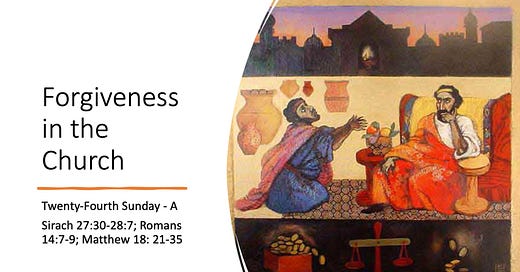Sirach 27:30-28:7; Romans 14:7-9; Matthew 18: 21-35
"Christ Jesus came into the world to save sinners, of whom I [Paul] am the foremost" (1 Tim. 1:15). From this sentence, the apostle concludes that if "a blasphemer, persecutor, and insolent opponent" (1 Tim. 1:13) could receive forgiveness then there is no limit to Christ's mercy (1 Tim. 1:16). Moreover, after experiencing God's mercy ourselves we should also forgive others: "as the Lord has forgiven you, so you also must forgive" (Col. 3:13; cf. Eph. 4:32). That is the message of the Liturgy of the Word today. But what will happen if we do not show mercy to others?
He "owed him ten thousand talents" (Matt. 18:24). That debt amounted to one hundred million denarii. Since the normal wage per day was one denarius (Matt. 20:2), that servant would need more than 2,739 years of work to repay his debt. On the other hand, his fellow servant owed him only a hundred denarii - three months of work would suffice to pay it back. The message is clear. First, we shall never be able to repay the debt of our sins, and second, the debts that our brothers and sisters owe us are trivial compared to the debt we owe to God.
"The master of that servant was moved with compassion" (Matt. 18:27) but the heart of the servant remained like a stone. He did not show any gratitude for being forgiven the debt (cf. Luke 17:11-19) and denied his fellow servant mercy (Matt. 18:28-30). On the occasion of celebrating the two thousandth anniversary of the birth of Jesus, Saint John Paul II asked the rich countries to reduce the debt of the poor countries. How many governments responded to that initiative?
How many times should we forgive (Matt. 18:21)? Jesus' response takes us to the times before the Flood when people were concerned not with forgiveness but with vengeance. Cain who murdered his brother was to be avenged sevenfold, and his descendant Lamech already seventy-sevenfold (Gen. 4:24). But society built on vengeance has no future and so Cain's generation perished in the Flood. Should we not, however, limit our forgiveness (Matt. 18:21)? In 1965, Polish bishops wrote a letter to German bishops that began with words: "We forgive and we ask for forgiveness". That letter began the process of reconciliation between the two nations. We are called to forgive "seventy-seven times" (Matt. 18:22).
"The Lord is merciful and gracious, slow to anger and abounding in steadfast love" (Ps. 103:8). Being slow to anger, however, does not mean that the Lord does not get angry, and he gets angry when he learns about the acts of injustice (Matt. 18:29). What are the consequences of His anger? "In anger his master delivered him to the torturers, until he should pay all his debt" (Matt. 18:34). What a tragic ending. He was already released and his debt forgiven, but his lack of compassion ruined everything. "The vengeful will face the Lord’s vengeance" (Sirach 28:1).
We live and die for the Lord (Rom. 14:7). Jesus Christ is our King and Lord. Each of us owed him a huge debt, which Jesus nailed to the cross (Col. 2:14). Should we not also have compassion on our brothers and sisters in Christ, just as Jesus had mercy on us (Matt. 18:33)? "As far as the east is from the west, so far has [Jesus] put our transgressions from us" (Ps. 103:12). Should we not also forgive our neighbor's injustice (Sirach 28:2)?
Jesus ends his parable with a warning that unless we forgive our brothers and sisters in Christ from the heart we will end up like that wicked servant (Matt. 18:35). So, whenever we are tempted to act like that wicked servant let us recall how much Christ has forgiven us and “overlook faults" (Sirach 28:7).




